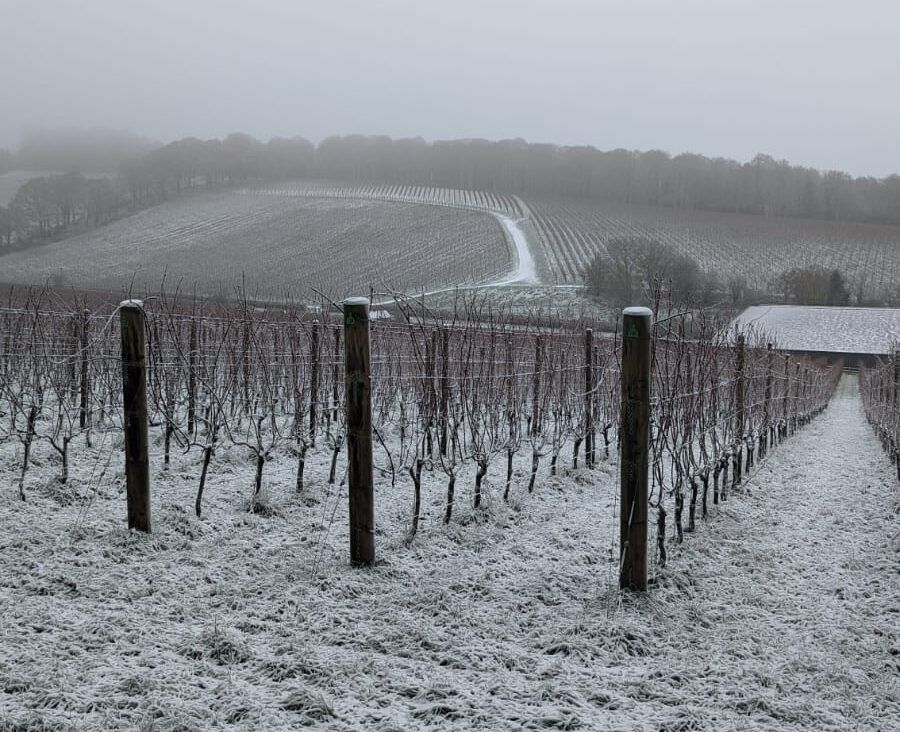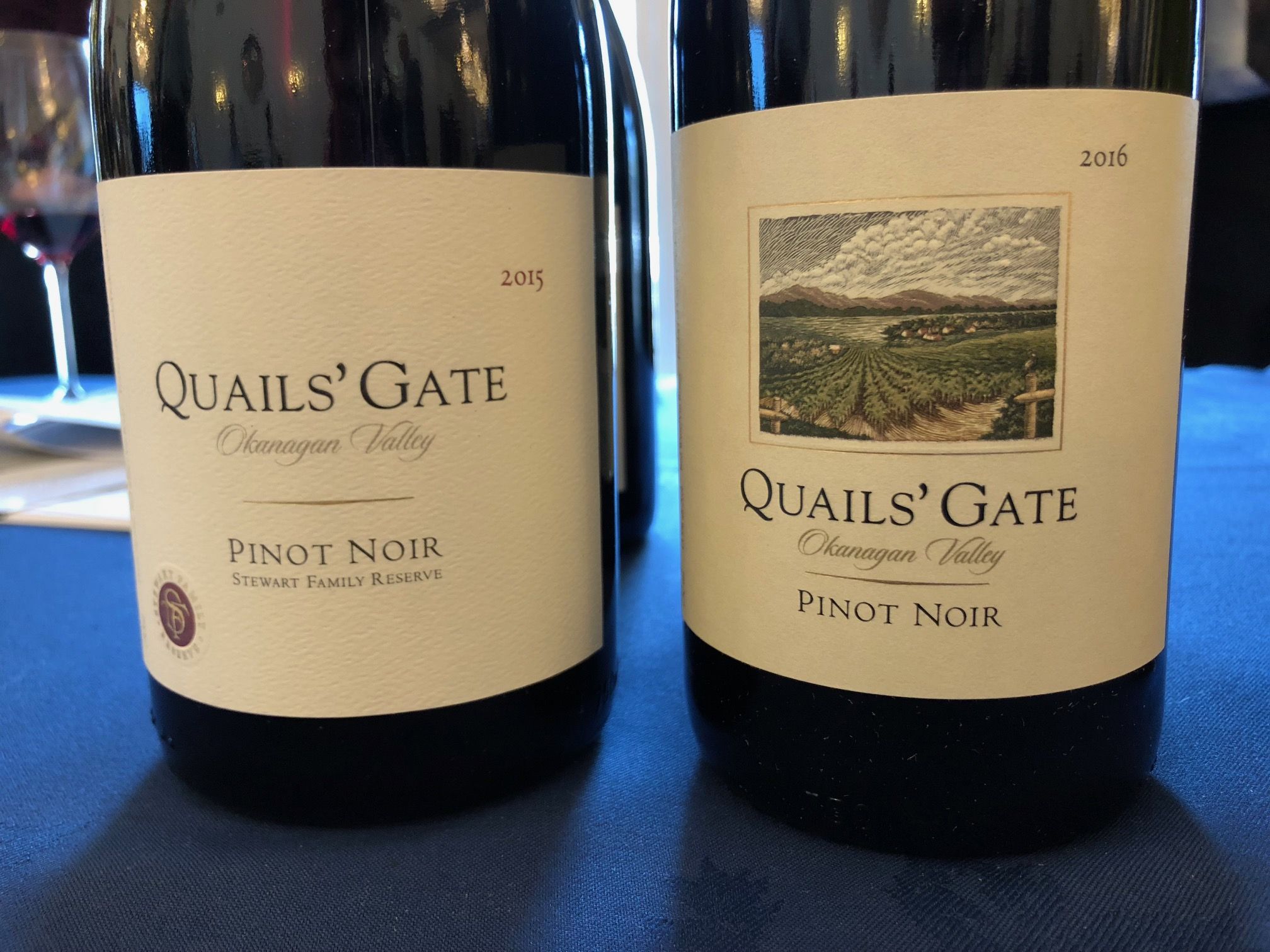“More and more people are discovering Hundred Hill wines for themselves and relishing what they find,” writes Dean.
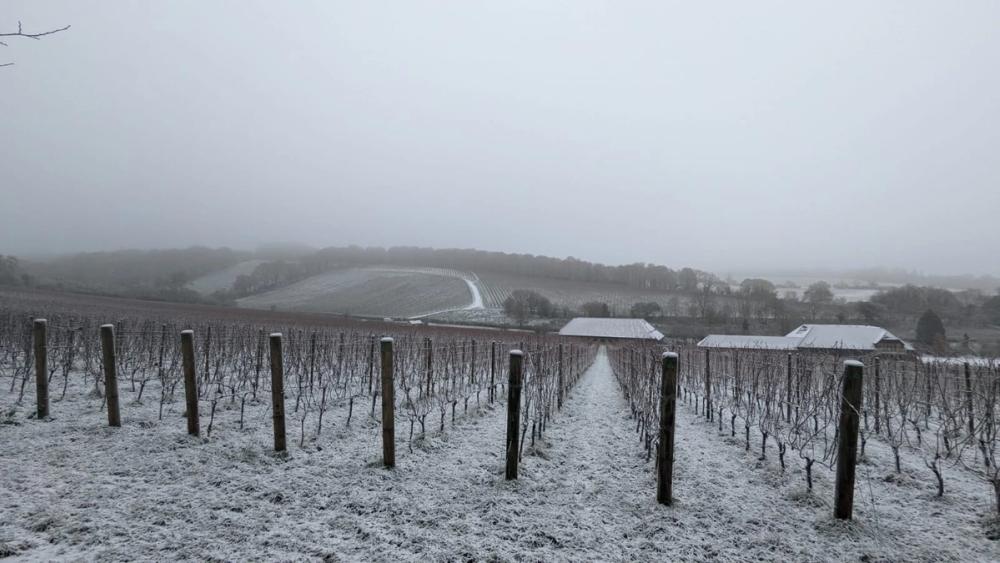
Hundred Hills: there are real advantages in being inland if you can solve the frost problem
When Hundred Hills owner Stephen Duckett and his wife Fiona started looking in 2009 for a property that was suitable for the production of English sparkling wine, they searched the length and breadth of southern England. Their exhaustive quest finally ended in the beautiful Stonor Valley, a few miles north of Henley, in the most quintessential of English rural settings: at Bank Farm, nestled down country lanes, flanked by woodland and situated close to the historic Grade 1 listed Stonor Park, itself lived in by the same family for 850 years and with its own cricket ground.
Attention to detail is the mantra of Duckett, who gained a first in engineering from Oxford University in 1990 when firsts were not doled out as freely as nowadays. That won him a scholarship to Harvard Business School, after which he spent the next two decades helping to establish a number of young software companies. Some such as Iris, Doubleclick and Kronos have become major technology businesses.
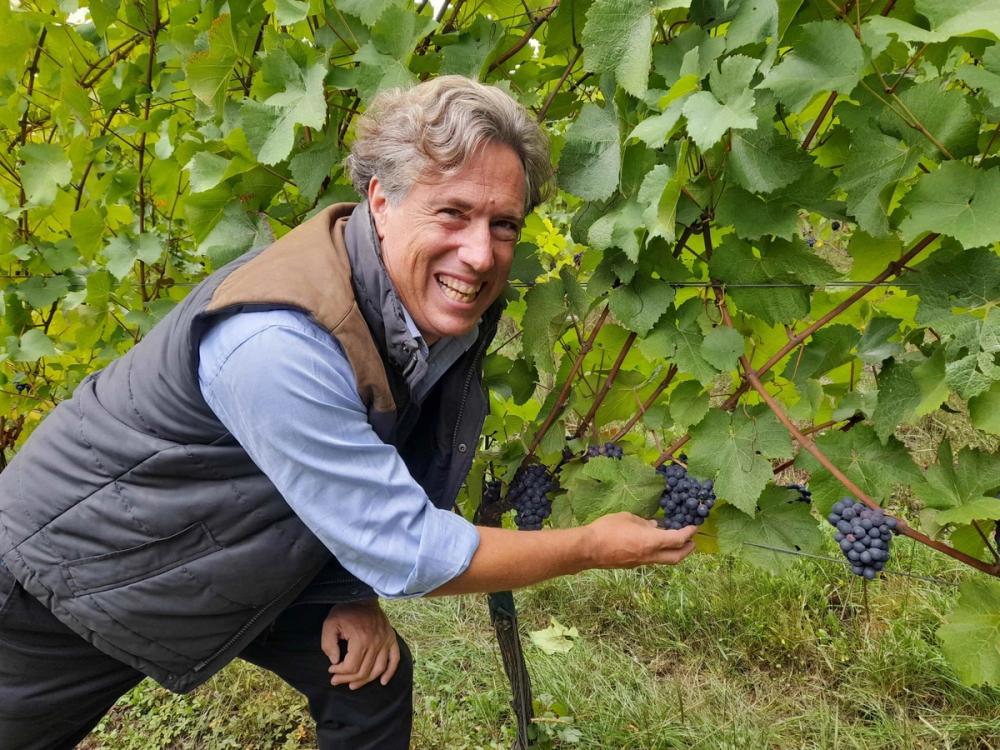
Stephen Duckett, October 2022
The appliance of science
As a farmer’s son from Somerset, though, Duckett missed the land, and thanks to an obsession with finding the best place to make wine, he instigated “an enormous amount of frost and airflow modelling as well as soil analysis.” This was performed on 50 sites over three years in Kent, Sussex and Dorset before his focus centred on the Chilterns.
“We looked everywhere,” he mused when I visited him at Bank Farm, aka the Hundred Hills winery, just before harvest, “but we concluded there are real advantages in being inland if you can solve the frost problem. You’re also drier at this time of the year, and there is much less pressure from botrytis and mildews. Last year, a difficult one for both in England, we had a perfectly clean vineyard. We had lots of people coming to see us that couldn’t quite believe it. But here is a textbook valley as it gets a lot of airflow and has no issues with frost.
“Over there is Aylesbury Plain: the bottom of that is minus 3 or minus 4 degrees on the really cold spring nights you worry about – lethal for a vineyard – but at the head of the valley it’s 2 or 3 degrees. That air drifting down the valley is enough to protect you. Steep slopes like we have here help a lot and woodlands a little, and we have frost fans from New Zealand that do a little bit of air movement, but really it’s our position close to the head of the chalk valley that’s so important.”
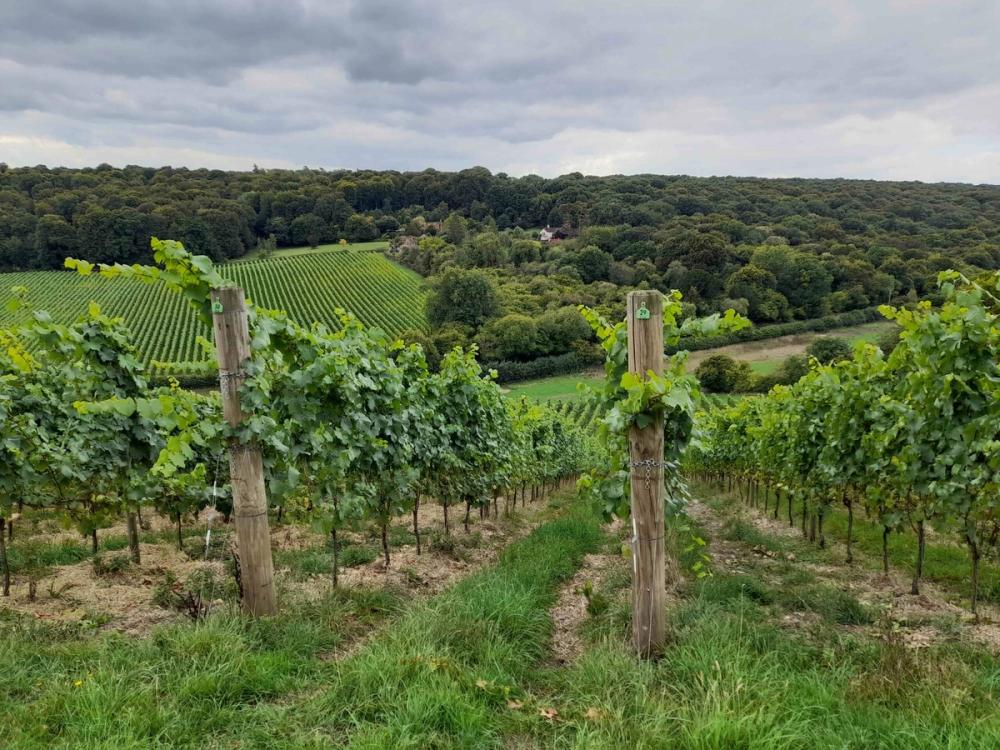
Hundred Hills just prior to harvest 2022
Apart from airflow and topography, what Duckett also badly wanted was the right soil. “This here was fallow grazing land for over 400 years – no one had used it for anything else,” he continued. “It was very, very poor calcareous soil on chalk. And 250 metres of soft chalk down to an aquifer, so it drains beautifully. Chalk holds those micro-droplets of water in its sub-structure, so in drought the vines get enough water out of the chalk sub-soils to stay healthy.”
Champagne expertise
Having acquired Bank Farm in 2012, Duckett then called on the advice of some Champagne heavyweights ahead of the planting of 17 hectares of vines (all protected two miles of deer-proof fencing). The well-respected Epernay viticulturist, Frank Mazy, who consults for Taittinger’s Domaine Evremond estate in Kent, recommended two low-yielding high quality clones – 95 for Chardonnay and 115 for Pinot Noir. No Pinot Meunier was deemed necessary due to the site’s cool nights and consequent ability to retain acidity. Also part of the advisory team were Dr Michael Salgues, a former winemaker for Roederer in California, and Pierre-Marie Guillaume, a prominent Champagne winemaker and professor of oenology at Montpellier.
While Duckett makes the wines – all of them sparkling with no intention to produce any still ones – he acknowledges that their quality is all down to the vineyard and his Italian viticulturist, Enrico.
“He arrived in 2013 with a rucksack on back and has never left,” Duckett smiled. “Sometimes you just get lucky. I couldn’t be here without him I don’t think. We interviewed about 30 people… mainly French or Italian. When you’re starting up, you need people who lead by example, and Enrico was clearly a doer.”
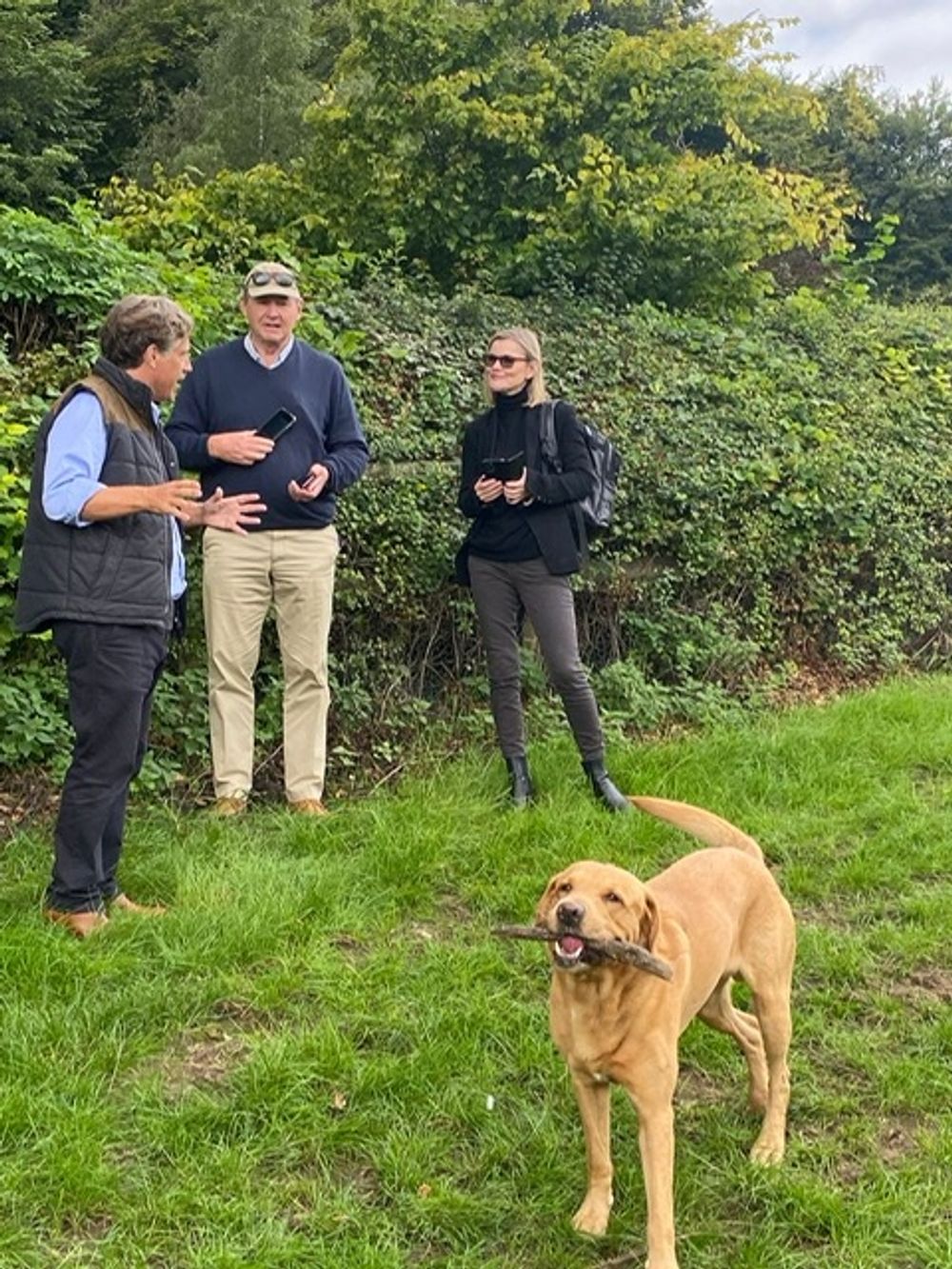
Stephen Duckett, Geoffrey Dean, Liss Garnett, Bullet (l-r)
Being an engineer, it is no surprise Duckett installed 300 sensors in the vineyards.
“These tell you all sorts of things – humidity, leaf wetness, soil wetness etc – but also a lot about nutrient availability. We don’t get eutypa here as we’re so young, and we’re very up on bio-security. We’re just not surrounded by other vineyards. We do employ organic practices although we’re not certified. Effectively we are organic. Downy mildew hit England last year, and this year powdery did. We didn’t get any at all. We have stunning old trees of over 100 years of age, and we’re surrounded by woodland on all sides.”
Sales strategy
Duckett looks to produce about 50,000 bottles per year.
“We make vintage-only wines that are very terroir-driven,” he said. “Usually in a given year, there are about five or six different wines. Apart from our Zero Dosage label, which gets some partial, we don’t put the wines through malolactic fermentation as that would see the detail of our very clean grapes lost. Regular batonnage adds richness.”
As for sales, which are going extremely well, over 95% of Hundred Hills’ labels are sold in the UK.
“We sell a quarter of our wines to the Oxford University colleges, such as Christchurch, Magdalene and Johns,” Duckett revealed. “The remainder is sold direct to consumers and high-end restaurants. It’s by the case only but you get free delivery in the UK. We also have several hundred people in our wine club. The USA is our main export market, but we even sell a little bit in Champagne – as a novelty.”
Indeed, the word is spreading fast just how good the Hundred Hills wines are. But Stephen Duckett, while one of the brightest of winemakers, is still something of a traditionalist.
“No garish marketing for us – we just want people to discover our wine for themselves.”
More and more people are doing just that, and relishing what they find.
Hundred Hills wines tasted
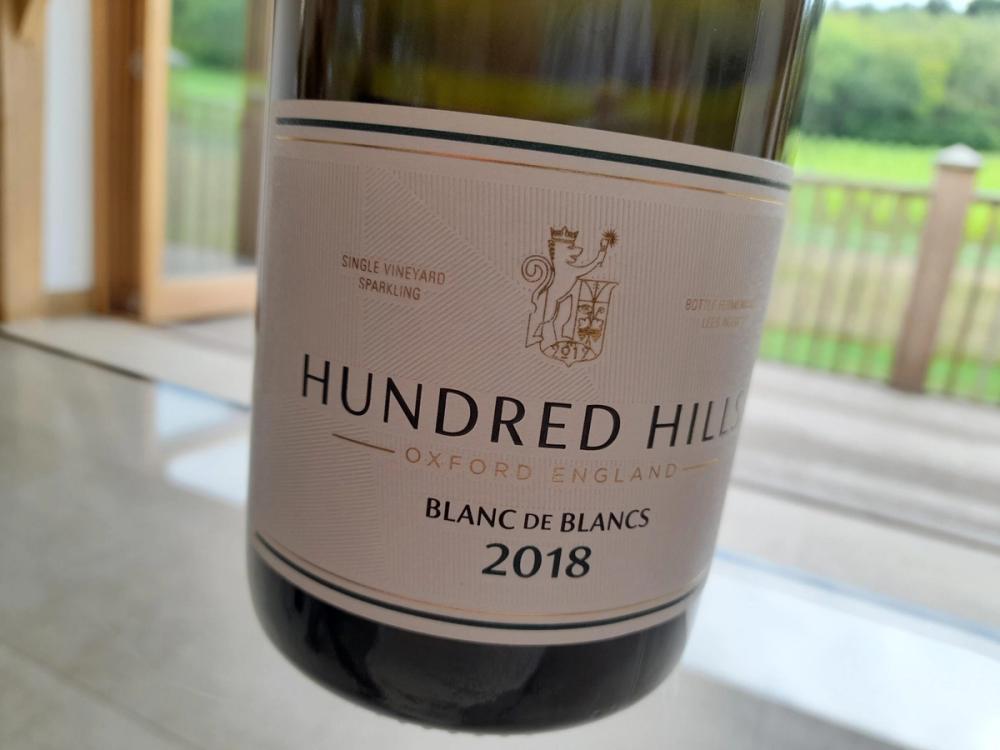
Hundred Hills BdB 2018: Top rated English BdB according to Jancis Robinson MW
‘Preamble’ 2018 RRP £37.50. 72% Pinot Noir, 28% Chardonnay. 30 months on lees. 5g/l dosage. Extremely lively acidity and tension (pH2.9); appealing apricot, peach and lime fruit; excellent length.
‘Blanc de Blancs’ 2018 RRP £63. 36 months on lees, 5g/l dosage. Crystalline purity to the citrus fruit with racy acidity. Creamy patisserie notes, yet delicacy and precision. A very lengthy finish.
‘Zero Dosage’ 2018 RRP £62.50. 72% Pinot Noir, 28% Chardonnay. 40 months on lees. Raspberry and red apple fruit with hints of yellow plum and salinity. Not yet released.
‘Illustration No 1’ 2018 RRP £62.50. Vinification and fruit as above, but 4g/l dosage. This softens the structured edges of its twin.
‘Signature Rose’ 2018 RRP £40. 80% Pinot Noir blended with 20% Chardonnay. 18 months on lees, 8g/l dosage. Intense rose-scented floral perfume with hint of hibiscus. Delicate wild strawberry notes on the palate with a core of freshness and some minerality to lift it.
‘Pinot Noir Rose de Saignee’ 2018 RRP £75. Only 600 bottles made from a single plot of this special wine. Fetching bright ruby colour from seven hours of bleeding off. 5g/l dosage. Red summer fruits with wonderful length and complexity.
